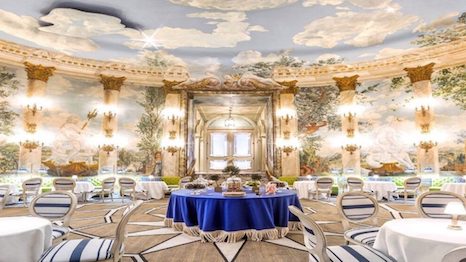NEW YORK – Unique experiences continue to be one of the defining characteristics of luxury purchases, as more mass market and premium labels encroach on traditional heritage brands.
During a panel, “Exploring the Increasing Importance of Experience to the Most Sophisticated Buyers of Luxury Products and Services,” at the Italian Luxury Summit on Nov. 7, several brand executives across different sectors explained how exclusive experiences set brands apart for affluents. The panel was moderated by Greg Furman, founder of The Luxury Marketing Council.
The Italian Luxury Summit was organized by the Italy-America Chamber of Commerce in collaboration with BCG and the Luxury Marketing Council.
Offline experiences
Bricks-and-motar locations remain a centerpiece to the overall luxury experience, as they offer consumers an opportunity to better connect to a brand's story and heritage. Despite disruptive companies, there is still a necessity for heritage brands to have a physical presence.
Boutiques, restaurants and hotels can all offer luxurious experiences that cannot be replicated digitally.

Dempsey & Carroll has been in the stationery business since 1878. Image credit: Dempsey & Carroll
Not only does Dempsey & Carroll's New York flagship, spearheaded by CEO Lauren Marrus, resemble a stationery museum, but at the brand's core is a celebration of the time-honored tradition of sending handwritten letters and notes. Bespoke stationery is a standout luxury during this era of technology over saturation.
To share the importance of the experience of handwritten correspondence, Dempsey & Carroll recently launched a Brand Friend program. Selected influencers share their appreciation for the brand and letter writing with other fans, while getting discounts and early access to paper products.

The Pierre offers afternoon tea. Image credit: Taj Hotels
Experiences, of course, are part of the very nature of the hospitality industry.
Upscale hotels can offer events that are more unique than those from other brands or homesharing services, such as afternoon tea or offsite excursions. Events and exclusive spaces within resorts also give guests the opportunity to meet new people, an experience that is not easily replicated.
As luxury brands like Lexus push their boundaries and expand into the yachting industry, brands like cruise line Ponant need to find new ways to stand out in a crowded marketplace. Ponant emphasizes authenticity, which is one of the most attractive qualities to millennials, and sophistication, which older generations tend to seek out.
Online experiences
With the advent of ecommerce, luxury brands still need to provide consumers with sublime digital experiences.
In many ways, a strong online presence is the first step in capturing the attention of the affluent customer. Eighty-five percent of all research happens online before an item is purchased.
U.S. fashion label Diane von Furstenberg is looking to make New York Fashion Week more immersive with a special 3D shopping experience.
DVF 360, built by Salesforce’s Success Cloud product, allows shoppers to browse its New York headquarters and shop with out needing to physically be there. DVF’s fall 2018 collection is showcased, along with the offices of the designer herself.
Available in DVF’s New York store and online, the experience provides a more exciting way to shop (see story).
As ecommerce becomes a greater part of the luxury goods business, store formats may change.
In the changing luxury business, the retail expansion that drove 60 percent of the growth in previous years will be replaced by organic growth, which will now account for 70 percent of the market's development. With consumers slowing their purchases of hard luxury in favor of experiences, BCG advises a revamped bricks-and-mortar strategy that optimizes efficiency of square footage (see story).
{"ct":"2SbLdWDhxVRNNqnIwmbe79yiV6DyHgV0UsX7Mq\/IRrb3L3dxi0ASK2H9UgO\/T9MifqPofcN0ficZu1j62ZFnXGWXiqnUbELzjQvYNMh2OAlFkgNGln\/Cr6Olya+P9mEZzZn5PPzNPX7X2bp\/K1+AWCNe03v2\/CFt8BxMbJrny0Mu5phmGNfhjnhMfOQpLX2YCqoZ4MBG+GRsMdnusZRzMJi8oQsCea2UvhaLs3V6IO3F1khOzEY01oCIGomlbfE4AeEdsi\/O8jJTFOQPX3A1W0cx1Rx5QeLboPcV2zn579e659z1xu55TA8\/u1HP1Y2NXvtYikInLPvuWLhqHtRMqZ0WTVSP3OYpM4N7Ju9aPhUP1OjzYKodtgC5TJr5v+Ff3ZikTVgpMwyANDxg2xdYIg1GA89WhBbGeIMd3RIf6y\/B7xGZYRrjIRNn7KYQsmzXXcmKEhOinUbIIqyjW1QQowU6Yl7g8w\/c2mU5mwTNNpFKvEK0Si7pDc5tbns1\/8F9pvD7vRgq8KWQkO2YKhcEhDrA53sXbXrwwK7AbWvPG+MkZhlm\/lk8g1fbH1p9pVILBpRYawfyrTga8tTGxA3EGAdGK8wfDU1c5bky5skfMOvC9curiWtpI2EzmuvR15lblOrXthTvPdU04WT62S+85UZMrFcFpfwX75\/D+gxL7cg5Cx4tLSXBMBibn8jyC2oauiFzxD5O8+VZAd64Rn8GLWJ\/JJogx41Mz\/aAO1h6FsFAzaqG2w2yWRALra5hEN2U9ybgeB3OXhkTXyCZ6qFN62oJb9WAf+cDdGgNL0IJVuZYeIiGbxbPyX4uy5JpVEgjnXqogDJ7rcLwzeY8SN0Ksurhc1AFuMsVON\/+eGD7HDifnhZHXoRhwnMH91qP7kLdfEtUMrrclYopbvFlSBcCj1oRvG66a1BguBGr08U9eMJU68nC0J4vG+zEPZ\/Nv6mbXKmr8H1Qv5aN4Pnlj5PBCiEYr3AKf\/fN8y2ZyXZAZyl6qw5xzl6ZCbRtQWnig37aPBks2809vM4GXqH92cI75OKpVuzd0ZS9zb9rLcpYkbAkVvACp1lHh5RtmW9lezD+Fb4wmvhqeh71cjphm8SN8XunfWjkXgNo2efI19eqyLH7YNbotg5WS27KOxJLMLhOa2HobffiQtXtIAcgvwLpqnrTMzs9Vj9TBgb3UdzwGP2MZvkP0CSqPFmR4vRvmHp+9\/IqtwT7v5jzRcK6AWDdKARr1OcZmWKW039m8ZfXgtfz9bLr873V96ao8Jqgr8g\/zbdnFgvsGNp5HOGq0CtXu0Wq9Su7RHgN4IJ\/UKddoYVdMPeztEBBaHyYqB0uukjvftz1JQsGHYT4DOtEPYN932szCFSDDgNd8AzWjZ9bGAmcxeVTuOuH7TGm466Aip9qkJWitx0udTwosU1cq3qW2w5X3HWhn0nBh8f4GvL2tOsObRgFS6kep+n\/FatYq0J0M6OnN6fY2aD8S7j7ZVIMUfVxb\/YCQNcQXJ9mDIGZQ52IbaxoxZBuQDaf\/a53TW5QMNZu\/hqp8+4O+UXShvhdbQn5lp8Bpif7W5+Jm+FV6Lgdqmq8iLS2A8BCbRUg+SnnRgUYgbVF5a+WqBPUWCFMMXroeYrrebasijXyvWPgGOIKbXSpNu12yol8RQGt9MyyUnfrCH8qbco7+QsA1zseeZjpDkarGyG157pNKbA+y49MXg6CYI5a7xGGjlkXJcPQcc+NkyQx2BkHcOBin5ZErHwAsz\/nx\/vUTTFu+4Ym9MP2fDZcuOaQGcSl2lgF0C6+e8SFHld00UHf5tVyVIzkPHC5\/PssSUOgLvxIp3EKRQVv0HdijFuFL0BwmMsRKVNLf8s9UNNTQR0UeVq54YcZ9exIW28\/grlEV3taXBT8R4c3olPR83MyykjHKyQgNMutBzCs1tyVr1s0oakcjWJ8HPgs36rQRxKg2Bsr7SrIRhLOLCvOAk\/dYs1TqLDgrdsM+TUUCB4gMyiXi0J40mECwNK+VTys9MQnmC0It6YX+pztNDqaPLCR+34XgxxTLttruseAoOr4+22dtA\/qUbDn8MK4NyJOeBgGV8J7mIF+BgDkaisxzeT9tXOucwqhGhlafDa8g7OZWftdOlE\/YiaOvGrwvDSDZLX3xYj7h7GD6oJB3aVWZNwyYFLGLB2m+OJXiAoOhN9sIR5QgDuNFTzA\/7b6NOy0q+jAhq7GWvi1kzF+jlVFntVZG6\/75Bb0z6aM3ipmXBRv8dil\/IipWgk0Gk+KouKqWbk1WoY0DIQ9vmq7jAQTja8xDRBTKDegx8vZgOuvK5tXbAo8f+18LtYeTcWXYRTkNv8x1QF\/vffLRElI0Mq8sx2B\/gYgf3pxZ1AzwcmudL0NuFZbBCaXCMpVFTBFBr7qH2BW7tYk4xvoRXtHDGzhjK\/sePcvYvsQlNYi6DgbrqgaLsjccXeFAp89ydFgakb\/RqUVxT6zwbjTmjqvkYGeKbweT35mB2hXsdc9dIX0ECSfcoki7JkS8nqyexNjNz7kJGNWe9Orsa4BoDqtttOP9qGrKsI1JBJQoqi8lreJduMO21JnoHbiIkhwXGNiZGNdflDWjTyAH\/el2Ifl5HIXMosVyGzrWqXO32qIWyLwGq+4LxrHzvVnL\/YqZPYTIKFa7pvhl3E8XXdWjYLQfFzqgltMSiHAXaorPbCZScp9WLiqDheuMAffEk9+ZyLZoCjk5cZS3FLjNXLQBcwiO0t7\/GIV9Bbhhyss4Ru19n\/1eyEvyRhA1Z8n2t1krU2MvLS0M6Ed3EZStBn0fXUaDRCSwAOEolAaNeunBjjBORUHweM4tif2YHRTq5qUr0nrsCowvEU74racyv1HAAACAAanzAs\/wykAe3Q4yZFEswNRecPqHZekosxg68bnwboS68fhuBeA3NnNliMqnzo8YAcj6anrrczlGb1J6dWRoIjVgGHWOphiqDU+l2laoVZhu1YfBLOlM1n\/7LVqjjc8yYPvaRhFbbJyrpAyIaiy1+B4nAjUpSLdEKUpy++XF7RnC03voDUWIRIF9PeluQg5\/AS1W7jbjoW6YTI33acuYgTpgsqCBVp5YD9B9Pz0PfeVmbv2zuHUvjaNWE3PRB9m1\/Ri5N8MJdd8OoQHG2zYGd7VFstVLXuNbM2+fUp3TY6oYQsKMYPfanpDKPBzWNEhJjOgjCzyzdeAQS4AXvH9XpxQ5pJkV4u5arqxjTTp\/N6jkqaZ+pYdU+4OxbADHk7DmcaIOnJ\/\/TIvXYXhANNrNvI1k4Mry9Zkm7x6Apr5fAF4dL9WaWuokN\/W6aQChx7vjHehN0pzRaBZY2ehTgynNCRfiVPVycaH\/+Z0BLTybV3+6Rgkd7EQDpnATFDammt0J2kgXyzzCjpy\/+ahXWSpgunuSQaaPwlufIAJI6VRS06Pat\/8dRWWlWT4aK+U1aZaFVb\/Zui3a7mRTeuH\/DIWNXNinaGhFR5Ek0UqrnvCDkaSrBcwn1MAUM+0oJxa4ejCjlF6uhV\/rxuhwJCMswdV1IkJ19H\/DdKptYX90z75STVMsD0arc9qbQSNr6Pu6KPczV\/rLeO2Yj26zxCqZfb7scWbjC5qXPdyVPEbyn+okeSHaTx3zVWt9ds\/HopwDnAZAS\/43BOo4qSlhiUNWkCb\/vUFdPUbNSyV1niJYki5IqdZahQqOv\/L3WjXPzyfjUWhRIapR2534SmwYm2rsbj1mY85ym0DDe9PQbDNKYKSYx6EoC8OuOFg0gTSHsUE0ZIDMKny1hGr2S55d2JjQd6tMGcaM\/J2jOUQzRkMwb026Jh3bMpXVeVIwCe14G+62Tinrs0b\/qFi\/\/XU1kINsb4VtkHUlNeZ5e59Fa+m59HhA9d+Bmy+TSwLnzlDfa6SwSptwsB\/ywfLmFg5gQWx7vkA6Fqbj5zfcYXCpnlWstY5YsvpQlDfpzrur6WjtNcc7IkChfoLO8m6KEkQfq3GcpdTTKc48yIFoV7WC0Zgr4p\/pSVVc7ZvIIAhy5Zpbg4hIXvvtvrNlZI9mkbpHH8Jftkv5lB7FNOz5\/dfv\/dozvsx8QWOuwOdV+sReRn2gSXQQyCkLyBNTELdAu2ulVZta14j1bFSyxRPKvn67s4oceGI7CxtQp4ML4DlDuZM6xsUOuY9v3uTGxADL3\/fc\/6GLwr4w3+pHEpj3gsW9CuF5vGGkbkLxMoPi1D8Kh5QxLTxncxqvX8L\/RlewRPeKFZDTwAtpqwAZf0kdOuY6kxVvx5gQ94NZXoPBIVvR+6LyMH1Bf8VYF2Z9L5IVjrsgv8gVxb60uOspHwNEvAK+OijM9AFP15rsUsua6aVZ48o4fORPvbfRQEMzwU2aQ9YYsOk3Cfn6c+QYDOuM24YUkj35HKVPVw2cWuuKLoIFPS+aUarNg2hu1LgOn1vgU6P6Tj+sYR8lr3tlIFY1wPzacoy4LXuiuscAUw2FVS37eOp314zUb9GmiouvZKqTMRhFTfWeJ+aMpJHnQox4\/7ZPTJidqWAxoN5jvT38dgwtSdJ6pO75aPsra6JcomiKSmNzqQXSj2IHbB+2oFoYsLYr1qaqFh2Iwm6HZRH4zGtOOqvPklrERON9qoeBvJ0CkzWEF3dz3ruDaftB3NE0UZqPMW\/b200LTDRq6gPA8fju516+qyjqH3TKPvx0WeAQ7pimygc9imsAbSbt4D2c\/5zliOeWeRr1WY0enwSlaSAx9lfY1Ywmb4eKduxrQYceTKkF6SP1jqs1sZmgvFGz3t5Qp1OZ6YCuFIQN5NCGXk7WEgzea95PxyH9p2VIgU1whfXg2DHOnmlePkEm23oqWamRzRjkf+Rx1Z2b41N2H3TCiOA27lsLXb5vTfxpGmb656tGa3G\/6z02i6Fig+epy3fvWetJh6O\/vxcGXekgT\/d86PpFvO8mVCaFEl\/iDXYviV1NgBEs5svwa2wwebPhdq89dqV0yNbx56tBWrvHomjFV+KCGj1TdmeM3C93H4kc6Ua5J0Y4FadHYUVd3pLgRDPrk40\/V4tZeo2d6gW8neXTWKMlTXuQowhYmhmwTFm2o3Ioap926LpLdxVU+3UlsOsG5Qob1TNJcv3wMdjIos1QEGdTe9b+hgW+mcjf6FaCeEbT6jtsoeHVQw\/Li7hnlxe4IizUs\/iBq1HzLd6MB0rrvSPwgfP+16uHQAQ5M+hby1xRR8InzF+8getW8cMIC83X+TygHpVel365rB\/YhUX5R+JzNDC0qKJQYWst+b+pnG8IPi2R9qJC7\/d+ynp\/L1ORparwulc4ZLgMQwdZLFSqaKupOKuou46vNVnhhegBIdq54\/7owSs5gz15KMKWMg4vAxntxlkgDsaUfqvXjp+\/UTqiCXx7NMWPjbSZCW8C3aPpF3drsr08Q2+PqzLsKV\/XHrLMjgcqIxD\/CbFqf+z\/AL+v0vRGH2wohZbjftcO6Sd2KiDTll4fypiOx\/jlrtndgDUIfjj4IdIb1wqW8uPaKb8wGPQ6+fbiq+sKaqYsM0ahPi1AS92ZCvkWAWHOXq3nhK8tY32o6boX+4cMXIVhtC1RwhWVUmOETfcFkAImkEzq7kxEUb\/1CKYS0NEJIkqJIbO5Hl8xRpvDwlx5enFf6w6y42x0vT+ns1UW7DJlse8iDLNNbCUDWOI7XRVYfKyaWI99Am2rrfqNQWLPf7OYFNobEpKC5V0bOrrKeX+YraELQghYG8wTFp6zAkssoeU8HubpYhGkjCs9hW3CJI9Ed116rSdS+MmaVs4WDj+n7+pk+A\/EvRXTL5xzZzRP4onrPDsf7OrpHqB3MPCnrCTyUU5rRUrNCboD7zF1Fm9osE6QVmLeBYKd\/gVFo5D4eUe14vjf7COxqUXJbjOqd7AuhRihOG2Hlp2\/6cQRAh3H48pUbBiA3YO4wbWgDpYNL\/e0q3d\/AN9f75FLaT42kWw5gfEudnmGbIZ66LOL8VNHXTBJp4vqIkaIzvK9R7DcgWjxh1akCgA8HEJygVJUPgA\/vO+MNRwyfG0QEVmDxc088fXFfU0OFa0TJ\/EO3vOFgLq0FC3KPRz6uuR3qWFX+s3ajp9khY2MVM\/n31k7tXbA+WN90dBeu6LBrz3BJrcJKMBK3sC0TVc+6vbvyMDbqYWtLGqN3UX1G61+CiEWxXKOpuutbSMfnMVJ8G\/YyDW3Yf857EQFS2awwI2dWA5zbuxB9vDUzFeBC1qH5A9Ay+KUIRVibYa8p\/vm1\/M1FCfhq0+KHpIGWDHph+iHgG+2\/mLo+rBW0pGYI2v104fJhQRlQO9r3Si0wfgUcsqD22w2zdpECnUNz4FbXc5RGt0UOftNMvA4G+OmH5ablgEJCR0nGubQ\/wWOwzlvCQeECc9ePHRK6Hd+Gs6dcC3tNhuFSRirCMM1Ajvfa++gN0i43ArEPOyUoeryjHrihPa9YEWszzfAgyBv0N18SofNkYo8Y5J\/kJNpzsqAVEYrOnuqYat+nP3opEtMRY2VUnAMCnsdBumfZryFz2RqIvE6rfk5sy2SgQOGu7KqfygdfwUSs5b4qPT9EUpBWiXv7PExxGy1cUQaiD0ACNROWiARF3Xgdx+QASG50Ozf68TuTtml4cPdVyhBWvA4eP6xWVIKg2xgk4oRBJnnBrYb+qZO0z\/Gx5JBZQG8NbPE9Nqk2swrS0gSZ8N3LqnH6KLOJ2hHdVsdiaTtgxAcclMfeRaGwkmFBHNP2wUjCBPr7cpFxF+tf0GPLt2EfaK27ULabtjLqsgv0AND2Oezojhq7YNnp3zqdQHP+\/ZU4V0MhfN3LgmuuFcNYe\/iEWyHi+4eUZXHkdBok5QBBeQTPwnq9PilzSa3JtneT1I0umor4d8JUTA5VLxzqYnWJJ7MObx0iWBd\/7I6bkzgAUmLxcqsnXI1qSEMiY1BPzI9KtFonVYK2qMIMfX\/4eaLQsGQnLOgqK\/GJJc1JhGEKWqZFGe8rtqXJZaTH85rB916o0J0tPhr9XXd3FJbi8aKNtzO9lrBsCtG4Tvz5G6Qs8hggRWeUSqUcpsxO49oRoQw7A3yYJiSwNrTi0BnYSiEA3wklWsXWbUWglfYxJ2A\/LNd73QEQ==","iv":"e272f4a9e43b972439dcccebcbf2d05a","s":"47ae67a3b1777d7b"}

 Gucci created a digital experience for its DIY program. Image courtesy of Gucci
Gucci created a digital experience for its DIY program. Image courtesy of Gucci